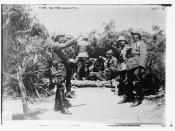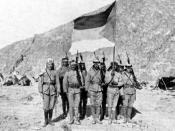British policy in the Middle East was not confined to Palestine. Its purpose, though now a defeated anachronism, informs British attitudes even today. It had its genesis in a historic misrepresentation: the inflation, out of all relation to the reality, of the so-called Arab Revolt during the First World War. This hoax was part of the intricate manoeuvres of the great powers at the end of that war. It was at first directed against France.
Early in the First World War, after the defeat at Gallipoli, a group of senior British officials serving in the countries on the fringe of the Ottoman Empire -- in Egypt and the Sudan -- conceived the idea of bringing the vast Arab-speaking areas of the Ottoman Empire under British control after the war. In the words of the then Governor General of the Sudan, Sir Reginald Wingate, they envisaged "a federation of semi-independent Arab States under European guidance and supervision .
. . owing spiritual allegiance to a single Arab primate, and looking to Great Britain as its patron and protector."1
The early disaster to British arms in the Gallipoli Campaign in 1915 provided the impulse. The British government called on its agents with contacts in the Arab-speaking countries to make an effort to detach the Arabs from the Turks. The men on the spot in Cairo and Khartoum decided that Hussein ibn-Ali, Sherif of Mecca, Guardian of the Moslem Holy Places, a semi-autonomous chieftain in Hejaz (Arabia proper), was the suitable candidate for levering all the Arabs out of the Turkish war machine. While London was interested in immediate military relief, the Arabists in Cairo and Khartoum contrived to, steer and manipulate the relations with Hussein toward their own more grandiose schemes. Hussein asked a high price for his participation in liberating his...



British Plans
You have written a good essay on British policy in the Middle East during World War I and its effects long after the war ended. You have illustrated how political intrigue can have lasting consequences, which can be especially dangerous in one of the more explosive regions of the world. Great job!
8 out of 8 people found this comment useful.